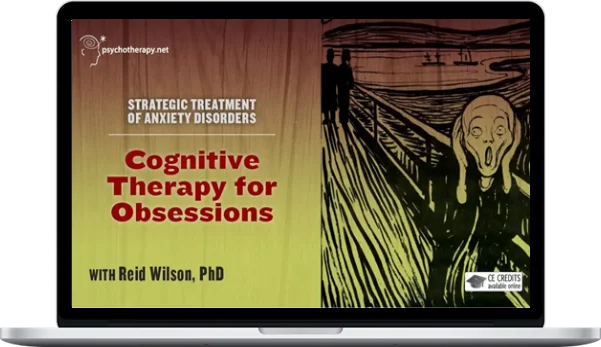Reid Wilson – Cognitive Therapy For Obsessions
$19.99 $11.00
»Delivery: Within 24hs
Description
Reid Wilson – Cognitive Therapy For Obsessions
Cognitive Therapy for Obsessions by Reid Wilson
In these live sessions with a patient suffering from obsessive thinking, Reid Wilson demonstrates tools and techniques of cognitive therapy that clinicians can begin to apply immediately.
Stopping obsessional thinking patterns is one of the most vexing challenges people deal with, and most therapists are equally mystified about how to really help their clients free themselves from the torture of fearful thoughts. Here, notable anxiety disorder expert Reid Wilson employs a variation of cognitive-behavioral and strategic methods in two live sessions, demonstrating his unique approach to tackling obsessive thinking.
Rita, a middle-aged mother, is plagued with anxiety about her health. Obsessed with what might be wrong with her, she spends much of her time seeking reassurance that she’s okay, from repeated internet searches to excessive doctors’ visits. Trying to avoid anything that triggers her fear of having a heart attack, Rita is missing out on living the active lifestyle she longs to live and barely enjoys time with her family and friends.
In two sessions with Rita, Wilson demonstrates the core concepts underlying his paradoxical approach to treating anxiety disorders. With humor, compassion, and clarity, he passionately encourages Rita to rise above the content of her obsessive thoughts and practice moving towards that which she fears, supporting her in learning to tolerate uncertainty. Calling on her courage, he helps her to dramatically alter her relationship to the anxiety.
In Depth
With humor, compassion and impressive persistence, Wilson masterfully helps Rita do a 180 when it comes to how she’s approaching her health anxiety. Challenging conventional wisdom about how to get better, Wilson’s paradoxical approach to change is reminiscent of Buddhist teachings that talk about suffering coming from resistance. Urging her to want her symptoms as opposed to trying to get rid of them, he turns everything upside down, making for a fascinating and refreshing approach to anxiety disorders in particular and life in general.
While kind and patient, Wilson is at times somewhat pushy and aggressive. On this aspect of his approach he says: “This method can be challenging to therapists who work in a less directive, more client-centered way. But these clients are really stuck in a faulty belief system. If we aren’t aggressive in our tactics, then we are going to be at the work for a long time.”
If you’re looking for a way to really make some inroads with your clients with anxiety disorders in a short period of time, this video is definitely for you.
By watching this video, you will:
- Learn the core concepts of Wilson’s approach to treating anxiety disorders.
- Understand how to conduct a highly focused assessment.
- Identify tools for helping clients increase their tolerance of uncertainty and discomfort
Specs
- Length of video: 2:44:00
- English subtitles available
About Reid Wilson
R. Reid Wilson, PhD is a licensed psychologist who directs the Anxiety Disorders Treatment Center in Chapel Hill and Durham, North Carolina. He is also Clinical Associate Professor of Psychiatry at the University of North Carolina School of Medicine. Wilson specializes in the treatment of anxiety disorders and is the author of Don’t Panic: Taking Control of Anxiety Attacks (Harper Perennial, 1996), Facing Panic: Self-Help for People with Panic Attacks (Anxiety Disorders Association of America, 2003), and is co-author with Edna Foa of Stop Obsessing!
How to Overcome Your Obsessions and Compulsions (Bantam, 2001). Wilson served on the Board of Directors of the Anxiety Disorders Association of America for twelve years and was Program Chair of the National Conferences on Anxiety Disorders from 1988-1991. In 2014 The Anxiety and Depression Association of America honored Wilson for a lifetime of service in treating anxiety disorders, awarding him the Jerilyn Ross Clinician Advocate Award at its annual conference in Chicago.
Learning Objectives:
- Describe the core concepts of Wilson’s approach to treating anxiety disorders
- Explain how to conduct a highly focused assessment
- Rate tools for helping clients increase their tolerance of uncertainty and discomfort
More courses from the same author: Reid Wilson
Delivery Policy
When will I receive my course?
You will receive a link to download your course immediately or within 1 to 21 days. It depends on the product you buy, so please read the short description of the product carefully before making a purchase.
How is my course delivered?
We share courses through Google Drive, so once your order is complete, you'll receive an invitation to view the course in your email.
To avoid any delay in delivery, please provide a Google mail and enter your email address correctly in the Checkout Page.
In case you submit a wrong email address, please contact us to resend the course to the correct email.
How do I check status of my order?
Please log in to HealthcareCourse account then go to Order Page. You will find all your orders includes number, date, status and total price.
If the status is Processing: Your course is being uploaded. Please be patient and wait for us to complete your order. If your order has multiple courses and one of them has not been updated with the download link, the status of the order is also Processing.
If the status is Completed: Your course is ready for immediate download. Click "VIEW" to view details and download the course.
Where can I find my course?
Once your order is complete, a link to download the course will automatically be sent to your email.
You can also get the download link by logging into your HealthcareCourse account then going to Downloads Page.
Related products
Total sold: 4








